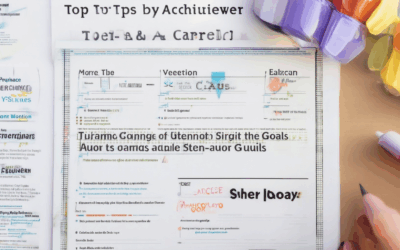In today’s fast-paced world, maintaining mental focus can feel like an uphill battle. Whether you’re tackling complex tasks, studying for exams, or simply trying to stay productive, the ability to concentrate is crucial for success. However, many of us struggle with staying focused, often feeling overwhelmed by distractions or losing track of our goals. If you’re looking to unlock mental focus and regain control over your attention, this guide is here to help. By exploring proven techniques, understanding the science behind concentration, and learning how to optimize your environment, you can develop strategies that will transform your ability to stay sharp and focused. From mindfulness practices to efficient time management, we’ll delve into methods that not only improve mental clarity but also equip you with tools to sustain focus long-term. Whether you’re dealing with ADHD, seeking ways to enhance productivity, or simply wanting to improve your overall cognitive performance, this article offers a comprehensive approach to sharpening your mental focus and achieving your full potential. Let’s embark on a journey to unlock the power of mental focus and discover the habits, techniques, and mindset shifts that will help you stay focused and motivated in any task you undertake.
Key Takeaways
– Mindset & Environment: Develop a growth mindset by breaking goals into manageable tasks and creating a distraction-free workspace.
– Physical & Mental Health: Prioritize regular exercise, sleep, and a balanced diet rich in brain-boosting nutrients like omega-3s.
– Focus Techniques: Use the Pomodoro Technique, batch tasks, and practice mindfulness to enhance concentration.
– Stress Management: Reduce stress through meditation, deep breathing, and positive affirmations to improve cognitive clarity.
– Lifestyle Choices: Stay hydrated, limit screen time, and establish a consistent sleep schedule for optimal focus.
– Progress Monitoring: Track focus habits, experiment with strategies, and engage with supportive communities for continuous improvement.

How Can I Sharpen My Mental Focus?
Sharpening mental focus involves a combination of strategies that cater to different aspects of your life, from physical health to cognitive techniques. Here’s a structured approach to enhance your concentration:
- Stay Hydrated : Drink at least 8 glasses of water daily to support brain function. Proper hydration can improve memory and attention.
- Practice Mindfulness : Dedicate 10 minutes each day to meditation. Consider trying guided meditations to ease into this practice.
- Prioritize Tasks : Use the Eisenhower Matrix to categorize tasks by urgency and importance, making it easier to manage your workload effectively.
- Limit Distractions : Set specific times for social media and video consumption. Use apps to block distracting websites during work hours.
- Engage in Physical Activity : Incorporate brief walks or stretching sessions during breaks to boost brain power and improve focus.
- Optimize Sleep : Establish a consistent bedtime routine, avoiding screens an hour before bed, to ensure adequate rest and cognitive function.
- Eat Brain-Healthy Foods : Include fish, nuts, berries, and leafy greens in your diet for optimal nutrient intake supporting brain health.
- Take Regular Breaks : Implement the Pomodoro Technique, working for 25 minutes followed by a 5-minute break, to maintain focus without burnout.
- Stay Curious : Allocate time weekly to learn new skills or read articles to keep your mind active and engaged.
- Set Clear Goals : Define specific, achievable goals and break them down into manageable tasks to channel your energy effectively.
- Practice Gratitude : Keep a journal to note things you’re grateful for, reducing stress and potentially enhancing your focus.
- Avoid Multitasking : Minimize switching between tasks. Focus on one thing at a time, closing unnecessary tabs, and giving undivided attention.
- Stay Organized : Use planners or digital calendars to manage your time better and reduce clutter in your workspace.
- Eliminate Negative Influences : Surround yourself with positive influences and environments to boost motivation and focus.
- Seek Professional Help : Consult a mental health professional if focus challenges persist, for personalized strategies and support.
Why Do I Struggle to Concentrate?
I’ve been grappling with concentration issues lately, and it’s quite perplexing. Here’s a breakdown of potential causes and solutions:
Causes of Poor Concentration
- Sleep Deprivation: With only 6 hours of sleep each night, I might not be meeting the recommended 7-9 hours for optimal brain function.
- Stress Levels: Work-related pressures are overwhelming me, leading to increased heart rate and a scattered mindset.
- Anxiety: Worries about upcoming events are causing tension and preventing me from focusing on tasks.
- Caffeine Intake: Excessive coffee consumption followed by energy crashes may be contributing to mid-day sluggishness.
- Dietary Habits: Snacking on unhealthy foods may lack essential nutrients needed for brain function.
- Screen Time Before Bed: Blue light from screens might interfere with melatonin production, affecting sleep quality.
- Lack of Exercise: Reduced physical activity could be hindering my ability to boost endorphins and maintain focus.
- Workspace Distractions: Clutter and multiple open windows on my computer are making it difficult to stay focused.
- Brain Fog: Possible due to poor sleep, nutrient deficiencies, or hormonal imbalances, potentially requiring medical consultation.
Solutions to Improve Concentration
- Improve Sleep Quality: Aim for 7-9 hours of sleep by establishing a consistent bedtime routine and limiting screen time before bed.
- Manage Stress Effectively: Practice relaxation techniques like deep breathing or meditation to alleviate workplace stress.
- Reduce Anxiety: Engage in calming activities such as yoga or journaling to ease worries and promote focus.
- Adjust Caffeine Consumption: Opt for decaf or herbal teas to maintain alertness without the crash.
- Enhance Dietary Choices: Incorporate brain-boosting foods like fish, nuts, and leafy greens into my meals.
- Limit Screen Exposure: Reduce evening screen time and use blue light filters to aid better sleep.
- Reincorporate Exercise Routine: Regular physical activity can improve mood and cognitive function, so I’ll aim for daily walks or exercises.
- Organize Workspace: Create a tidy and distraction-free environment to enhance focus.
- Seek Professional Help: Consult a healthcare provider if brain fog persists to rule out underlying conditions.
Taking these steps individually and collectively may help me regain control over my concentration and productivity. By addressing each area systematically, I hope to find relief and improved focus.

How to Fix Poor Focus
Improving focus requires a combination of lifestyle adjustments, habits, and strategies. Here’s a structured approach to overcoming poor focus:
- 1. Prioritize Sleep
- 2. Maintain a Healthy Diet
- 3. Stay Hydrated
- 4. Incorporate Physical Activity
- 5. Practice Mindfulness and Meditation
- 6. Set Clear Goals and Use Time Management Techniques
- 7. Minimize Distractions
- 8. Take Regular Breaks
- 9. Stay Organized
- 10. Limit Multitasking
- 11. Practice Gratitude
- 12. Seek Professional Help if Needed
Ensure you’re getting 7-9 hours of quality sleep per night. Lack of sleep significantly impacts cognitive function and focus.
Eat nutrient-rich foods such as fruits, vegetables, lean proteins, and whole grains. Avoid processed foods and sugary drinks, which can cause energy fluctuations.
Drink plenty of water throughout the day to maintain hydration, which is essential for brain function. Consider herbal teas or adding electrolytes if needed.
Engage in regular exercise, including aerobic activities, strength training, and flexibility exercises like yoga. Even brief walks during breaks can boost focus.
Invest in mindfulness or meditation practices to reduce stress and improve concentration. Start with just 5 minutes daily and gradually increase duration.
Define your objectives and use methods like the Pomodoro Technique to break tasks into manageable chunks, reducing overwhelm and boosting productivity.
Use tools like noise-canceling headphones or apps to block distracting websites. Create a dedicated workspace and schedule work during quieter hours.
Implement a 90-minute work cycle inspired by the Doppler effect, allowing for focused work followed by short breaks to refresh your mind.
Utilize to-do lists or planners to manage tasks and reduce anxiety. Prioritize tasks based on urgency and importance to ensure critical actions are addressed first.
Focus on one task at a time to allow for deeper processing and reduced errors. Complete tasks entirely before moving on to the next.
Cultivate a mindset of gratitude through daily affirmations or reflections to enhance overall well-being and focus.
If focus issues persist, consult a healthcare provider for potential underlying conditions and receive personalized strategies for improvement.

How to Train Your Brain to Focus
Focusing requires a combination of mindset, strategy, and environment. Here’s a structured approach to enhance your concentration:
- Mindset Techniques:
- Goal Setting: Break down larger objectives into manageable tasks. This reduces overwhelm and increases the likelihood of completion.
- Positive Thinking: Approach challenges with a constructive mindset, viewing obstacles as opportunities to grow rather than hindrances.
- Mindfulness Practice: Engage in brief daily mindfulness sessions. Techniques like deep breathing can help clear your mind and reduce stress.
- Physical Activity:
- Regular exercise improves cognitive function. Incorporate activities like walking, yoga, or strength training into your routine.
- Aim for at least 30 minutes of moderate exercise most days of the week.
- Environment Optimization:
- Create a dedicated workspace free from distractions. Use noise-canceling headphones if working in a noisy area.
- Minimize screen time by scheduling breaks and using apps that help track focus duration.
- Sleep Hygiene:
- Aim for 7-9 hours of quality sleep each night. Establish a consistent bedtime routine to improve sleep quality.
- Consider reducing screen time before bed to promote relaxation.
- Nutrition and Diet:
- Consume brain-boosting foods such as berries, avocados, and fatty fish rich in omega-3s.
- Stay hydrated and avoid excessive caffeine or sugar intake, which can cause energy fluctuations.
- Time Management Strategies:
- Use the Pomodoro Technique: Work for 25 minutes, then take a 5-minute break, repeating this cycle.
- Batch similar tasks together to minimize task switching and improve efficiency.
- Progress Tracking:
- Keep a focus journal to document your strategies and outcomes. Reflect on what works and what doesn’t to refine your approach.
- Join online communities or groups to share experiences and gain additional insights.
By integrating these strategies, you can develop habits that enhance your focus and overall productivity. Experimentation is key, so find the methods that resonate most with your personal preferences and lifestyle.
How to Reset Your Brain for Better Focus
To effectively reset your brain for improved focus, consider implementing the following strategies:
- Stay Hydrated : Drink plenty of water to flush out toxins and maintain optimal brain function. Proper hydration supports cognitive clarity and focus.
- Prioritize Sleep : Aim for 7-9 hours of quality sleep each night. Ensure your sleep environment is conducive to deep sleep stages, which are crucial for memory consolidation and focus.
- Practice Mindfulness : Dedicate a few minutes daily to mindfulness or meditation to reduce stress and enhance concentration. Even short sessions can significantly improve mental clarity.
- Engage in Physical Activity : Incorporate moderate exercise into your routine, such as walking or stretching, to boost blood flow and support brain function.
- Consume Brain-Boosting Foods : Include omega-3-rich foods like fish, nuts, and seeds in your diet to support brain health. A balanced diet overall can aid in resetting and optimizing brain performance.
- Manage Stress Effectively : Employ techniques like deep breathing or positive affirmations to reduce stress, which impairs cognitive functions. Consistent practice can lead to noticeable improvements in focus.
- Minimize Distractions : Create a dedicated workspace and use tools like noise-canceling headphones or apps to block distracting stimuli. These tools can significantly enhance your ability to maintain focus.
- Challenge Your Brain : Regularly engage in activities that stimulate your intellect, such as puzzles or new skills, to improve cognitive flexibility and prevent mental fatigue.
By integrating these strategies into your daily life, you can effectively reset your brain for better focus and overall cognitive performance.

Understanding Why Your Attention Span is Short
Your attention span may be shorter due to several factors, including multitasking, poor sleep habits, inadequate nutrition, stress, and environmental influences. Here’s a breakdown of possible causes and solutions:
- Reducing Multitasking: Limit switching between tasks. Focus on one activity at a time to enhance concentration.
- Improving Sleep Quality: Aim for 7-9 hours of quality sleep. Establish a consistent bedtime routine to support cognitive function.
- Nutritional Considerations: Eat brain-boosting foods rich in omega-3s, antioxidants, and vitamins. Stay hydrated to maintain optimal cognitive performance.
- Managing Stress and Anxiety: Practice relaxation techniques like meditation or deep breathing to reduce stress levels impacting focus.
- Minimizing Passive Consumption: Reduce time spent on mindless activities like excessive screen usage. Engage in more active pastimes to sharpen attention.
- Active Learning Techniques: Interact with information through discussions or application exercises to improve retention and engagement.
- Optimizing Work Environment: Create a clutter-free, well-lit workspace that promotes focus and comfort.
- Challenging Yourself: Take on tasks that are stimulating and require greater effort to maintain interest and attention.
By addressing these areas, you can work towards improving your attention span and overall productivity.




0 Comments